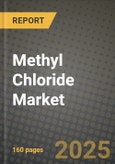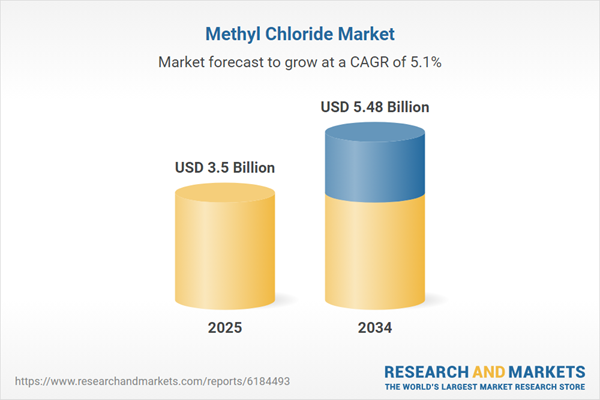Methyl Chloride Market
Methyl chloride serves as a pivotal chemical intermediate in the global specialty chemicals ecosystem - produced primarily via methane chlorination or by reacting methanol with hydrochloric acid. It finds substantial usage across silicone polymer manufacture (for silicones used in sealants, adhesives, lubricants), agrochemicals, pharmaceuticals, refrigerants/foam blowing agents and quaternary ammonium compounds for surfactants and personal‑care products. Recent years have seen accelerating interest in its use for silicone feedstocks and as a methylating agent in specialty chemical syntheses. Key trends include the growth of the construction and automotive sectors (which drive silicone demand), the rise of quats/surfactants for personal care, and increasing regulations and sustainability pressures prompting producers to optimise processes and explore greener alternatives. Competitive landscape features regional players expanding capacities, forming alliances for feedstock security (methane, methanol) and focusing on process safety and emissions controls. Other market dynamics include volatility in feedstock (methane/methanol/hydrochloric acid) prices, stringent environmental & safety standards for handling the flammable gas, and the incremental switch in emerging markets from imports to indigenous production. Overall, the methyl chloride market is positioned for moderate yet sustained growth as end‑use demand broadens, process efficiencies improve and regulatory frameworks evolve.Methyl Chloride Market Key Insights
- Silicone feedstock dominance: A major share of methyl chloride demand is driven by silicones (sealants, adhesives, lubricants) used in construction, automotive and electronics - growth here directly lifts methyl chloride consumption.
- Growth in quaternary ammonium & surfactants: Use of methyl chloride as a methylating agent in the manufacture of quats (fabric softeners, personal care) is gaining traction, presenting a significant ancillary demand stream.
- Emerging market expansion: Rapid industrialisation in Asia Pacific (construction, automotive, electronics) is fuelling regional production and consumption of methyl chloride, shifting the supply demand balance globally.
- Feedstock & cost sensitivity: Fluctuations in methane/methanol and HCl feedstock costs, plus energy and catalyst use, materially impact margins and investment decisions for producers in the methyl chloride space.
- Regulatory and safety pressures: Given methyl chloride is a flammable gas and intermediate, regulatory burdens on storage, emissions, handling and supply chain logistics are increasing and may create barriers for small producers.
- Process & sustainability innovation: Producers are investing in higher efficiency chlorination reactors, catalysts, and low emission technologies - as well as exploring greener production routes - which can lead to competitive advantage.
- Supply chain localisation trend: Some emerging region producers are shifting from import dependency to local manufacturing of methyl chloride to reduce logistics, cost and regulatory risk - affecting global trade flows.
- Substitution risk in mature markets: In developed markets, longer term risk arises from possible substitution by alternative methylating agents or silicone feedstocks, driven by cost, regulation or sustainability concerns.
- Feed forward demand in pharmaceuticals & agrochemicals: The increasing complexity of pharma and agrochemistry syntheses that rely on methyl chloride as an intermediate offers upside potential, albeit much smaller in volume compared to silicones.
- Competitive consolidation and capacity expansions: Key players are either expanding capacity in low cost regions or consolidating through partnerships/acquisitions to secure feedstock, scale and logistics efficiency - shaping the competitive landscape going forward.
Methyl Chloride Market Reginal Analysis
North America
The region is characterised by well‑established chemical infrastructure, a strong downstream silicone and sealants industry, and stringent environmental/safety regulation. These factors drive stable demand for methyl chloride but also impose high compliance and cost pressures. Capacity additions tend to be incremental and geared towards supply reliability rather than aggressive growth.Europe
Europe sees moderate growth in methyl chloride driven by high‑value silicone applications, personal care and speciality chemicals. However, regulatory intensity (emissions, chemical safety, REACH‑type frameworks) constrains new capacity. Localisation of feedstock and import dependence are key focus areas.Asia‑Pacific
This region presents the strongest growth momentum for methyl chloride. Industrialisation, booming construction and automotive sectors, growth of electronics manufacture, and rising personal‑care consumption in markets like China, India and Southeast Asia contribute to accelerating demand. Producers are expanding local capacity and feedstock integration.Middle East & Africa
Demand is currently nascent but evolving. While large scale methyl chloride production remains limited, regions such as the Gulf are developing chemical complexes and integrating feedstock (methane, HCl) into value‑chains. Growth is driven by petrochemical diversification and export ambition, though regulatory, logistics and investment risks remain.South & Central America
Uptake of methyl chloride is gradual, primarily via silicone, agrochemical and surfactant uses as regional industrial base expands. Local production is limited, making the region reliant on imports, but opportunities exist for producers who locate near feedstock or integrate forward into downstream chemical manufacturing.Methyl Chloride Market Segmentation
By Function
- Intermediates
- Refrigerants
- Solvents
By Application
- Silicone Production
- Butyl Rubber Production
- CM
- HPCM
- HBCM Production
- Building Material Production
- Quaternary Ammonium Compound Production
Key Market players
Dow, Shin-Etsu Chemical, AGC Inc., INEOS, Nouryon, Tokuyama Corporation, Gujarat Alkalies & Chemicals (GACL), SRF Limited, Occidental Chemical (OxyChem), Kem One, Sumitomo Chemical, Solvay, Sinopec, Shandong Jinling, Xinhua ChemicalMethyl Chloride Market Analytics
The report employs rigorous tools, including Porter’s Five Forces, value chain mapping, and scenario-based modelling, to assess supply-demand dynamics. Cross-sector influences from parent, derived, and substitute markets are evaluated to identify risks and opportunities. Trade and pricing analytics provide an up-to-date view of international flows, including leading exporters, importers, and regional price trends.Macroeconomic indicators, policy frameworks such as carbon pricing and energy security strategies, and evolving consumer behaviour are considered in forecasting scenarios. Recent deal flows, partnerships, and technology innovations are incorporated to assess their impact on future market performance.
Methyl Chloride Market Competitive Intelligence
The competitive landscape is mapped through proprietary frameworks, profiling leading companies with details on business models, product portfolios, financial performance, and strategic initiatives. Key developments such as mergers & acquisitions, technology collaborations, investment inflows, and regional expansions are analyzed for their competitive impact. The report also identifies emerging players and innovative startups contributing to market disruption.Regional insights highlight the most promising investment destinations, regulatory landscapes, and evolving partnerships across energy and industrial corridors.
Countries Covered
- North America - Methyl Chloride market data and outlook to 2034
- United States
- Canada
- Mexico
- Europe - Methyl Chloride market data and outlook to 2034
- Germany
- United Kingdom
- France
- Italy
- Spain
- BeNeLux
- Russia
- Sweden
- Asia-Pacific - Methyl Chloride market data and outlook to 2034
- China
- Japan
- India
- South Korea
- Australia
- Indonesia
- Malaysia
- Vietnam
- Middle East and Africa - Methyl Chloride market data and outlook to 2034
- Saudi Arabia
- South Africa
- Iran
- UAE
- Egypt
- South and Central America - Methyl Chloride market data and outlook to 2034
- Brazil
- Argentina
- Chile
- Peru
Research Methodology
This study combines primary inputs from industry experts across the Methyl Chloride value chain with secondary data from associations, government publications, trade databases, and company disclosures. Proprietary modeling techniques, including data triangulation, statistical correlation, and scenario planning, are applied to deliver reliable market sizing and forecasting.Key Questions Addressed
- What is the current and forecast market size of the Methyl Chloride industry at global, regional, and country levels?
- Which types, applications, and technologies present the highest growth potential?
- How are supply chains adapting to geopolitical and economic shocks?
- What role do policy frameworks, trade flows, and sustainability targets play in shaping demand?
- Who are the leading players, and how are their strategies evolving in the face of global uncertainty?
- Which regional “hotspots” and customer segments will outpace the market, and what go-to-market and partnership models best support entry and expansion?
- Where are the most investable opportunities - across technology roadmaps, sustainability-linked innovation, and M&A - and what is the best segment to invest over the next 3-5 years?
Your Key Takeaways from the Methyl Chloride Market Report
- Global Methyl Chloride market size and growth projections (CAGR), 2024-2034
- Impact of Russia-Ukraine, Israel-Palestine, and Hamas conflicts on Methyl Chloride trade, costs, and supply chains
- Methyl Chloride market size, share, and outlook across 5 regions and 27 countries, 2023-2034
- Methyl Chloride market size, CAGR, and market share of key products, applications, and end-user verticals, 2023-2034
- Short- and long-term Methyl Chloride market trends, drivers, restraints, and opportunities
- Porter’s Five Forces analysis, technological developments, and Methyl Chloride supply chain analysis
- Methyl Chloride trade analysis, Methyl Chloride market price analysis, and Methyl Chloride supply/demand dynamics
- Profiles of 5 leading companies - overview, key strategies, financials, and products
- Latest Methyl Chloride market news and developments
Additional Support
With the purchase of this report, you will receive:- An updated PDF report and an MS Excel data workbook containing all market tables and figures for easy analysis.
- 7-day post-sale analyst support for clarifications and in-scope supplementary data, ensuring the deliverable aligns precisely with your requirements.
- Complimentary report update to incorporate the latest available data and the impact of recent market developments.
This product will be delivered within 1-3 business days.
Table of Contents
Companies Mentioned
- Dow
- Shin-Etsu Chemical
- AGC Inc.
- INEOS
- Nouryon
- Tokuyama Corporation
- Gujarat Alkalies & Chemicals (GACL)
- SRF Limited
- Occidental Chemical (OxyChem)
- Kem One
- Sumitomo Chemical
- Solvay
- Sinopec
- Shandong Jinling
- Xinhua Chemical
Table Information
| Report Attribute | Details |
|---|---|
| No. of Pages | 160 |
| Published | November 2025 |
| Forecast Period | 2025 - 2034 |
| Estimated Market Value ( USD | $ 3.5 Billion |
| Forecasted Market Value ( USD | $ 5.48 Billion |
| Compound Annual Growth Rate | 5.1% |
| Regions Covered | Global |
| No. of Companies Mentioned | 15 |









